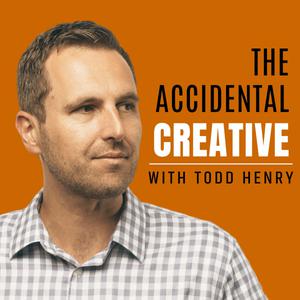
The Accidental Creative with Todd Henry
Todd Henry
How to be brilliant at a moment's notice
- 13 minutes 21 secondsAssassins
In today's episode of Daily Creative, we dive into the subtle yet powerful dynamics that can undermine our creative potential. Imagine you're driving down a familiar road, and your car begins to pull to one side, requiring constant correction just to stay on track. This metaphor perfectly encapsulates how certain hidden forces can slowly erode our creative output and lead us astray from our best work. These stealthy saboteurs are what we call the "Assassins of Creativity".
We'll explore how these assassins—Dissonance, Fear, and Expectation Escalation—work quietly behind the scenes to hinder our productivity and innovation. Through a recent keynote from Todd Henry, we break down these assassins and provide actionable insights on how to counteract them. From aligning tactics with strategy and purpose, to taking calculated risks in the face of fear, and managing expectations to maintain creative white space, this episode is packed with valuable lessons on sustaining creative excellence.
Five Key Learnings from this Episode:
- Dissonance - A gap between what we are doing and why we are doing it can create tension and zap our creative energy.
- Fear - When the perceived consequences of failure outweigh the perceived benefits of success, it prevents us from taking necessary creative risks.
- Expectation Escalation - Constantly increasing expectations can squeeze out the white space needed for creativity and innovation.
- Unnecessary Complexity - Overcomplicating problems can introduce dissonance and hinder a creative team's progress.
- Opacity Phenomenon - A lack of clear reasoning behind tasks can lead to dissonance and reduced engagement from creative professionals.
Get full interviews and daily content in the Daily Creative app at DailyCreative.app
Mentioned in this episode:
NEW BOOK! The Brave Habit is available now
Rise to important moments in your life and work by developing the habit of bravery. Available in paperback, ebook, or audiobook wherever books are sold. Learn more
21 January 2025, 9:00 am - 17 minutes 6 secondsDefy
In this episode, we explore the nature of taking a stand.
Our guest, Dr. Sunita Sah (author of Defy), a professor at Cornell University and an organizational psychologist, joins us to delve deep into the concept of defiance. Dr. Sah proposes a new definition of defiance—acting in alignment with your true values when there is pressure to do otherwise. She reveals insights from her research that suggests most of us are conditioned from an early age to comply and how this conditioning affects our ability to act on our values.
We also discuss the five stages of defiance that individuals go through as they act according to their principles. Dr. Sah emphasizes the importance of explicitly knowing and writing down our values to ensure that our actions align with them.
Key Learnings:
- Defiance Redefined: Defiance is not about rebellion but about acting in alignment with your true values, despite external pressures.
- Conditioned Compliance: From a young age, we are conditioned to comply and this affects our ability to act in alignment with our values.
- Insinuation Anxiety: We often hesitate to speak up or correct others because we fear insinuating that they are wrong or unethical.
- Stages of Defiance: The five stages—tension, acknowledgment, escalation, threat of non-compliance, and act of defiance—help us understand the process of standing up to pressure.
- Value Clarity: Knowing and explicitly writing down our values can help reduce stress and align our actions with our principles.
Get full interviews, daily episodes, and more at DailyCreative.app.
Mentioned in this episode:
NEW BOOK! The Brave Habit is available now
Rise to important moments in your life and work by developing the habit of bravery. Available in paperback, ebook, or audiobook wherever books are sold. Learn more
14 January 2025, 9:00 am - 15 minutes 36 secondsHunch
In this episode we explore the importance of remaining open to unexpected detours and serendipitous moments in our creative and personal lives.
Our guest, Bernadette Jiwa, a recognized authority on storytelling in business innovation and the author of the book Hunch, offers deep insights into how curiosity, empathy, and imagination are vital traits for spotting transformative opportunities. Jiwa explains the crucial difference between ideas and opportunities, emphasizing the importance of addressing real problems rather than merely generating ideas.
We explore the concept that sometimes our objectives and goals can act as blinders, preventing us from recognizing valuable peripheral discoveries. Jiwa shares practical strategies for developing better awareness and tapping into serendipity, fostering the kind of curiosity and attention that can lead to breakthrough innovations.
Throughout the episode, Jiwa provides examples of how successful entrepreneurs have turned seemingly mundane observations into impactful solutions, reinforcing the value of remaining curious and empathetic in our pursuits.
Key Learnings:
- Unexpected Discoveries: Often, the most significant breakthroughs come from being open to accidents and unexpected findings, as demonstrated by Alexander Fleming's discovery of penicillin.
- Curiosity, Empathy, Imagination: These three qualities are common traits among individuals who consistently generate great ideas and can be cultivated by anyone.
- Opportunities vs. Ideas: True innovation addresses opportunities (problems begging for solutions) rather than just coming up with ideas.
- The Limitation of Objectives: Strict adherence to goals can limit our ability to see valuable opportunities in our surroundings.
- The Power of Noticing: Paying attention to the world around us, asking pertinent questions, and listening to our environment can lead to significant insights and innovations.
Get full interviews and daily content in the Daily Creative app at DailyCreative.app.
7 January 2025, 9:00 am - 15 minutes 49 secondsGood Thinking
In this episode, we explore the importance of the narratives we surround ourselves with, as highlighted by our guest, Gabriel Reilich, the head of content and innovation at Upworthy and author of the book Good People. Gabriel discusses the profound effects of uplifting stories and how they can reshape our perceptions and empower us to engage more positively with the world around us.
We discuss George Gerbner's "Mean World Syndrome" theory and its modern-day implications, emphasizing the need to consciously balance our media consumption. Positive stories are not just feel-good content; they can fundamentally alter our outlook, creativity, and leadership.
Join us as we uncover the power of good thinking and positive storytelling to inspire better leadership, creativity, and a kinder world.
Key Learnings from the Episode:
- The Power of Humility and Generosity: Dale Schroeder's life teaches us that extraordinary impact comes from focused intention, modest living, and generous actions.
- Media Influence on Perception: George Gerbner's theory of "Mean World Syndrome" highlights how media consumption can distort our view of reality and affect our creativity and leadership abilities.
- Ripple Effect of Kindness: Positive actions and stories can create far-reaching impacts, benefiting many individuals beyond the initial act.
- Mindful Media Consumption: Being intentional about the stories and media we consume can help maintain a more hopeful and accurate perspective of the world.
- Everyday Interactions Matter: Seemingly small acts of kindness can have profound effects on others, offering solace and support during challenging times.
Get full interviews and daily content in the Daily Creative app at DailyCreative.app
17 December 2024, 9:00 am - 23 minutes 11 secondsSo Emotional
Show Notes: Daily Creative - "So Emotional"
In this episode of Daily Creative, we explore the profound impact of emotion in our creative processes. We begin with a captivating story about Walt Disney and how his emotional response to rundown amusement parks sparked the creation of Disneyland—revolutionizing family entertainment forever.
We sit down with Greg Hoffman, former Chief Marketing Officer of Nike and author of "Emotion by Design," to delve into the power of creativity and emotion in brand building. Greg shares insights from nearly three decades at Nike, emphasizing that the most successful brands are those that form deep emotional connections with their audiences. He highlights the essential balance between analytical precision and the ineffable qualities of art, urging brands to respect the craft of storytelling rather than just producing content for distribution.
We also dive into a memorable story featuring legendary basketball coach, Mike Krzyzewski (Coach K), and how his advice to Nike’s marketing team parallels the creative journey—seeing what others don’t and transforming deep insights into iconic work. Greg discusses fostering a culture of risk-taking and empathy, which is vital in generating innovative and emotionally resonant work.
Five Key Learnings from This Episode:
- Emotional Connection is Key: Emotional responses to everyday problems can lead to groundbreaking solutions and innovations.
- Balancing Art and Science: Effective brand building requires a balance between analytical strategies and creative, human-centric storytelling.
- Empathy as a Starting Point: Successful creativity often begins with empathy, unpacking layers beyond simple observations to deeply understand the audience's needs.
- Encouraging Risk-Taking: Incentivizing risk-taking within your team can lead to more innovative and emotionally engaging outcomes.
- Vision Advantage: Developing a unique vision allows creatives to see opportunities others might miss, turning potential failures into compelling successes.
Get full interviews and daily episodes in the Daily Creative app at DailyCreative.app.
Mentioned in this episode:
NEW BOOK! The Brave Habit is available now
Rise to important moments in your life and work by developing the habit of bravery. Available in paperback, ebook, or audiobook wherever books are sold. Learn more
10 December 2024, 9:00 am - 17 minutes 26 secondsEarly Bird, Second Mouse
In this episode, we delve into the question of whether it's better to be first to market... or second. Safi Bahcall, author of "Loonshots," discusses the importance of nurturing big ideas and differentiates between product-type (P-type) and strategy-type (S-type) innovators. Through historical anecdotes and industry examples, we explore whether it's more advantageous to be first or second to market, and how to leverage your strengths for lasting success.
Five Key Learnings:
- First vs. Second to Market:Being first isn't always an advantage. Sometimes being second allows you to learn from the first mover's experiences and refine your approach.
- Importance of Storytelling:Transformers succeeded partly due to a compelling narrative and superior marketing, emphasizing the power of storytelling in connecting with audiences.
- Innovative Blind Spots:P-type innovators can miss strategic market shifts, while S-type innovators might overlook technological advancements.
- Ambidexterity in Innovation:Combining product innovation with strategic innovation can significantly enhance the sustainability and reach of your ideas.
- Self-Awareness:Understanding your strengths and compensating for your weaknesses through complementary skills is crucial in navigating competitive markets.
Get full interviews, daily episodes, guides, Q&A segments, and more at DailyCreative.app.
Mentioned in this episode:
NEW BOOK! The Brave Habit is available now
Rise to important moments in your life and work by developing the habit of bravery. Available in paperback, ebook, or audiobook wherever books are sold. Learn more
3 December 2024, 9:00 am - 18 minutes 16 secondsWhy Productive Passion Is Your Advantage (keynote)
In this episode we revisit Todd's powerful talk delivered at Schermerhorn Symphony Hall in Nashville, TN for the Story Conference. Todd discusses the importance of shunning comfort zones, overcoming fear, and identifying your productive passion to ensure we empty ourselves of our best work by the end of our lives.
He also delves into practical questions to help you discover your own productive passion and emphasizes the importance of fighting the right creative battles. With engaging anecdotes and suggestions, this episode is a call to action: define your principles, take bold steps, and strive to put your best work into the world, ensuring you live and ultimately, die empty.
Key Learnings:
- Embrace Innovation Despite Resistance:New and dangerous ideas often face strong opposition, but persevering is key to bringing transformative work into the world.
- Avoid the Comfort Trap:External validation can lead to complacency. Strive to continuously challenge yourself and push beyond your comfort zone.
- Overcome Fear:Fear often disguises itself as wisdom, preventing action. Recognize and confront your fears to unlock new opportunities.
- Identify Your Productive Passion:Discover what you're willing to suffer for—this dedicated pursuit helps navigate the forces of comfort and fear.
- Live Purposefully to Die Empty:Ensure you don't take your best work to the grave. Live each day with intention, contributing your unique gifts to the world.
Get full interviews and daily content in the Daily Creative app at DailyCreative.app.
19 November 2024, 9:00 am - 19 minutes 35 secondsKinder
In this episode, we reflect on the importance of vulnerability and kindness in fostering meaningful relationships, both personal and professional. Our guest, James Rhee, author of Red Helicopter, recounts an impactful kindergarten experience that taught him the value of goodwill and sharing. He likens the power of kindness to the magical world of "Harold in the Purple Crayon," emphasizing our ability to create goodwill through our actions.
We then delve into a conversation with Eric Barker, renowned for his book Plays well with Others. Eric reveals surprising insights about our relationships, especially how "frenemies" tend to cause more stress than outright enemies. He discusses ways to engage with difficult people empathetically, and he underscores the importance of vulnerability in building strong, supportive communities.
The episode wraps up with actionable advice from Todd’s latest book, The Brave Habit, focusing on how to cultivate brave teams through healthy conflict, protection of teammates, and the giving and receiving of feedback.
Key Learnings:
- Vulnerability is Crucial: Being open and honest, even when it's difficult, is key to forming genuine relationships.
- Goodwill is Powerful: Small acts of kindness can create lasting positive impacts.
- Manage Ambivalent Relationships: "Frenemies" can be more stressful than outright enemies, so it’s vital to manage those relationships carefully.
- Engage in Healthy Conflict: Effective teams don't avoid conflict—they engage in it healthily and constructively.
- Empathy and Community: Building communities requires patience, empathy, and a focus on face-to-face interactions rather than digital ones.
Get full interviews and daily content in the Daily Creative app at DailyCreative.app
Mentioned in this episode:
NEW BOOK! The Brave Habit is available now
Rise to important moments in your life and work by developing the habit of bravery. Available in paperback, ebook, or audiobook wherever books are sold. Learn more
12 November 2024, 9:00 am - 14 minutes 30 secondsSay What They Can't Unhear
In today's episode, we dive deep into the intriguing world of perception and communication. It all begins with a story about how a seemingly simple movie night turned into a revelation about differing perspectives. We explore how our interpretations of the same events can vary widely, reflecting our own stories and lenses.
Joining us is Tamsen Webster, a message designer with 25 years of experience in marketing and messaging. She shares insights from her new book Say What They Can't Unhear, unveiling why some messages stick while others fail to resonate. Tamsen introduces us to the four primary categories of listeners: actives, ambivalence, indifference, and antagonists. Each category requires a unique approach when crafting messages for effective communication.
Tamsen explains the critical importance of understanding the deeper 'why' behind our messages to reach our audience's core beliefs and values. We discuss how influential stories and beliefs can shape perceptions, often leading us to believe in something despite contradicting evidence, as illustrated by the Theranos scandal.
We learn that to inspire change and build buy-in, we need to structure our messages around elements our audience already agrees with, support their deeper beliefs, and be patient as change happens in layers.
Key Learnings:
- Our personal lenses and stories shape how we interpret and perceive messages.
- There are four primary audience categories: actives, ambivalence, indifference, and antagonists.
- Understanding the deeper 'why' behind your message is crucial for effective communication.
- Our underlying stories and beliefs significantly influence our perceptions and can be manipulated.
- Change happens in layers, requiring patience and alignment with deeper principles and values.
Get full interviews, daily episodes, Q&A, and more at DailyCreative.app.
5 November 2024, 9:00 am - 27 minutesSeize The Moment
In this episode, we explore the stories of two remarkable individuals who took bold steps to seize opportunities in their lives, despite facing incredible challenges.
First, we hear from Trey Sheneman, a marketing consultant and a father whose son, Bear, was born with a unique birth defect that severely impacted his hearing. Trey shares the heartwarming journey of how watching Wheel of Fortune became a therapeutic ritual for Bear and led Trey to audition for the game show. Against the odds, Trey's determination and strategic planning not only landed him a spot on the show but also resulted in a life-changing win for his family.
Next, we delve into the powerful narrative of Bo Cornelius, who faced a life-altering experience after a car accident that led to a prison sentence. Despite the overwhelming circumstances, Bo found a way to inspire and lead from within prison walls. His journey of redemption and his efforts to create a leadership development group in prison culminated in a significant event that continues to impact many lives.
Key Learnings:
- Seize Unexpected Opportunities: Recognize and act on unique situations that can change your life, even if the odds seem against you.
- Preparation is Key: Thorough preparation and a strategic approach can significantly enhance your chances of success.
- Take Agency Over Circumstances: Control what you can in any situation to create better outcomes for yourself and others.
- Transform Adversity into Growth: Even in the darkest moments, there are opportunities for personal growth and leadership.
- Be Present and Brave: Make the most of every opportunity with bravery and a well-thought-out plan, as these moments can define your life.
Get full interviews and daily content in the Daily Creative app at DailyCreative.app.
Mentioned in this episode:
NEW BOOK! The Brave Habit is available now
Rise to important moments in your life and work by developing the habit of bravery. Available in paperback, ebook, or audiobook wherever books are sold. Learn more
29 October 2024, 9:00 am - 20 minutes 17 secondsThis Is Strategy
In this episode, we are joined by renowned author and strategist Seth Godin, who shares invaluable insights into understanding and developing effective strategies.
We delve into the concept of elegant versus inelegant strategies, with Seth providing compelling examples of how simple, effective solutions can resolve complex problems. He also discusses the critical distinction between strategy and tactics, and highlights the dangers of ignoring systemic inertia while pushing for change.
Key Learnings:
- Simplify Your Strategy: Focus efforts on simplicity and elegance rather than over-complicating strategic plans.
- Identify Blind Spots: Surround yourself with trusted advisors who can help you recognize and overcome potential blind spots in your strategy.
- Work With, Not Against, Systemic Inertia: Identify and align with existing systemic dynamics to facilitate change without wasting energy.
- Separate Strategy from Tactics: Understand that strategy involves forward-thinking and positioning, while tactics are the specific actions taken to achieve strategic goals.
- Leverage Existing Incentives: Align your desired outcomes with existing incentives within your organization or system to effectively drive change.
Listen to the full 30 minute interview at DailyCreative.app.
22 October 2024, 9:00 am - More Episodes? Get the App
Your feedback is valuable to us. Should you encounter any bugs, glitches, lack of functionality or other problems, please email us on [email protected] or join Moon.FM Telegram Group where you can talk directly to the dev team who are happy to answer any queries.
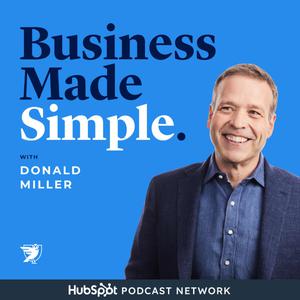 Business Made Simple with Donald Miller
Business Made Simple with Donald Miller
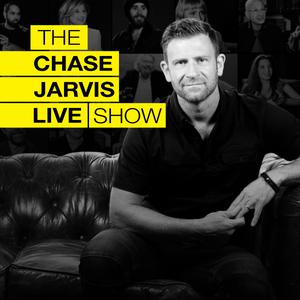 The Chase Jarvis LIVE Show
The Chase Jarvis LIVE Show
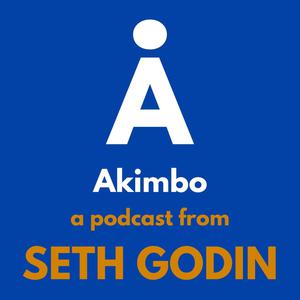 Akimbo: A Podcast from Seth Godin
Akimbo: A Podcast from Seth Godin
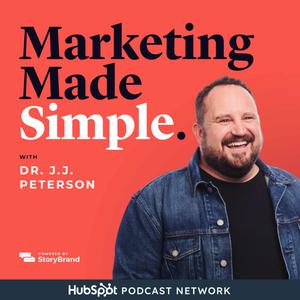 Marketing Made Simple
Marketing Made Simple
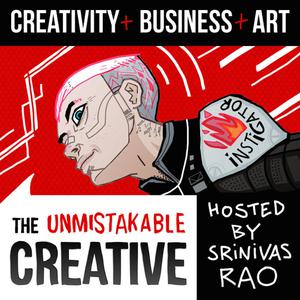 The Unmistakable Creative Podcast
The Unmistakable Creative Podcast
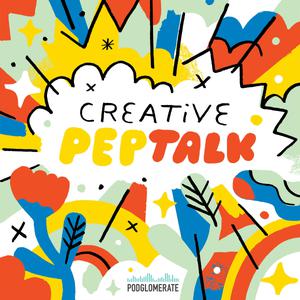 Creative Pep Talk
Creative Pep Talk